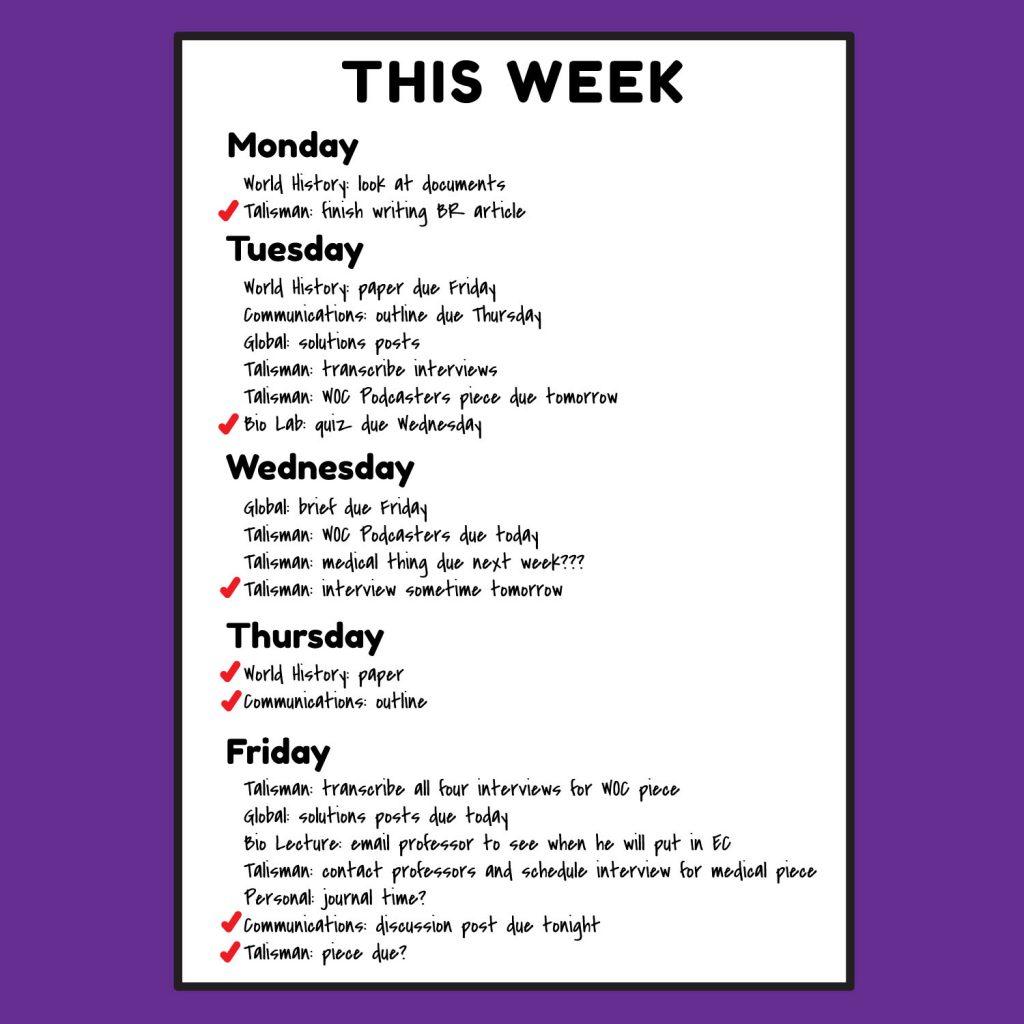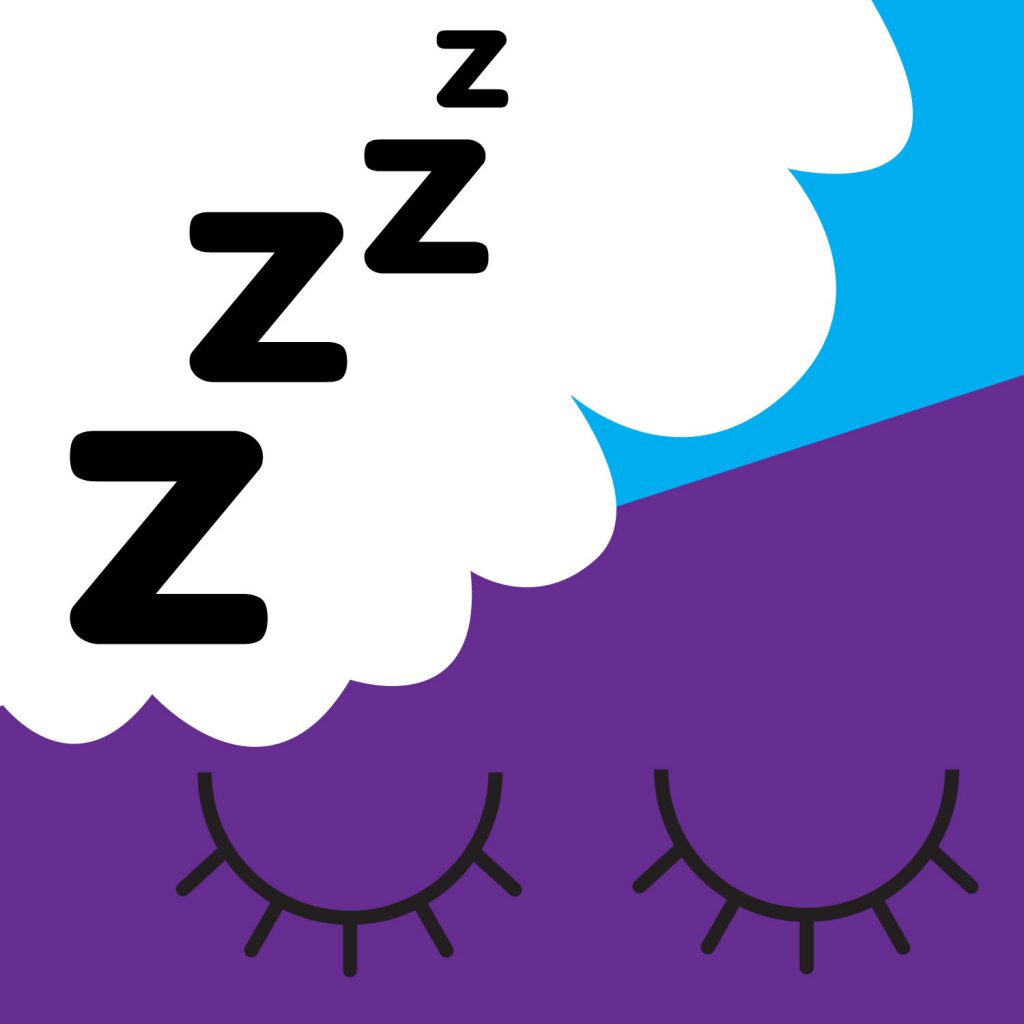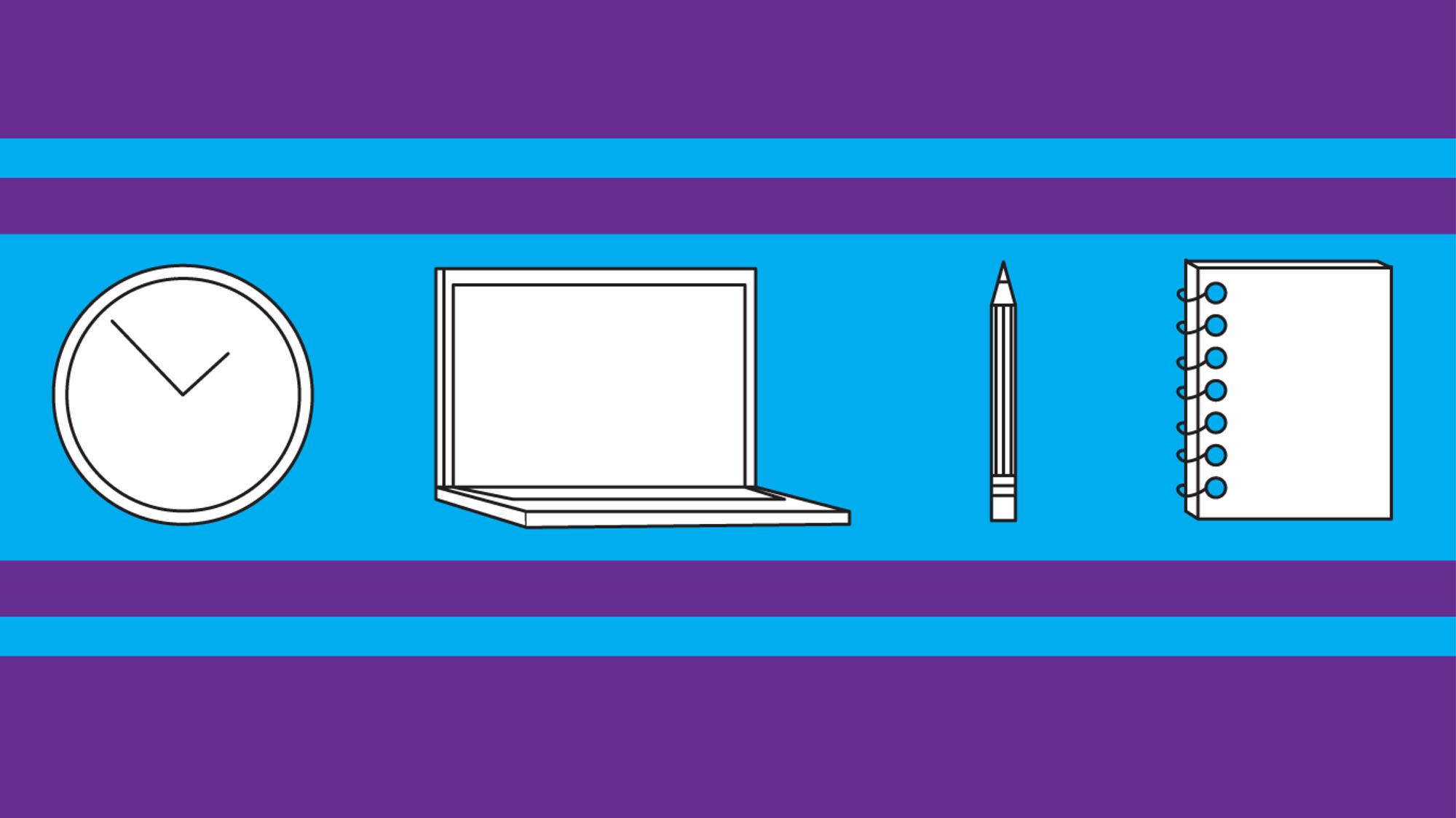As someone who spent the entire fall semester of her freshman year at home, I consider myself something of an expert on how to stay productive in the struggle that is all online classes. The steps to being organized include writing a weekly to-do list, keeping a schedule and de-stressing in a way that brings balance to your life.
Below are a few tips on how to stay organized this semester.
- To-do lists
Every Sunday night, I create a general to-do list of tasks I need to complete that week. The format is simple: the header names the date for that week (i.e. To-do list Jan. 25-29, 2021). I list the most important assignments due that week before writing the tasks I intend to complete each day.
Important things due:
- Talisman: article due 1/28
- Communications: theory paper due 2/2
- World history: upcoming midterm deadline
- Biology lecture: exam 3 due Monday
- Global social issues: exam 2 due Tuesday
After I list my most important assignments, I write down the rest of the week’s work, recording what day the assignments are due. Working remotely makes it easy to lose motivation for assignments.
Variety is not only the spice of life, it’s one of the most useful techniques in avoiding the fatigue that comes with routine. For this reason, I break the small assignments I have due for each class up into daily pockets of work.
For instance, I may split up an assignment, like the weekly labs due in my biology lab, into something that I do over a few days. Maybe on Monday, Wednesday and Friday, I complete one lab each.
I would typically work on a paper all day instead of working on one or two things from each class. I allow myself between 1-2 days to work on a paper, but for some it is more beneficial to do a small piece of a major project each day until it culminates into the final product. Try and see what works for you!
Monday:
- Talisman: transcribe interviews
- Talisman: write piece (reminder: due at 8 p.m.)
- Communications: write speech outline
- World history: read documents and answer questions
- Email: respond to professor
- Personal: return black overall skirt (and cry about it because it’s super cute!)
- Biology lab: quiz
I recommend keeping track of academic, professional and personal weekly goals. Remember that daily goals to complete assignments are tentative! As a perfectionist, I know the slippery slope of setting numerous academic goals to complete in one day.

- Keep a schedule and stick to it
For some, routine may be the enemy. But for others, it is the beat they march to. I am one of those people. Sticking to a routine schedule helps me evade the unnecessary stress that comes with sporadically completing assignments and throwing wrenches into my plans.
- Take breaks
Online courses can be more monotonous than in-person ones. Sitting at a desk all day, eyes glued to a glass screen can be mentally draining at times. Breaks can help you avoid burnout and stay mentally organized and calm.
I try to take breaks after completing 1-3 assignments. If I’m working on a large assignment like a paper or writing a longer piece, I allow myself a 30- to 60-minute long break.
Smaller assignments are different. Say for instance, if I had written down on my to-do list that I wanted to write two discussion board posts and take notes on a specific chapter for an upcoming test, I wouldn’t take a break until I’d completed all three of these things. This time I’d only take a 10 minute break after all three assignments so that I could keep my momentum going.

- Destress
You’re sitting in the library; coffee in hand. You’re debating whether you should keep studying for the exam that’s due tomorrow or if you should walk back to your room and take that well deserved nap. In the case of staying organized and keeping up with all of your assignments, I say you should take that nap.
Stress not only affects students’ behavior, emotions and contributes to them being sleep deprived, it also negatively impacts their academic performance, according to Penn Foster. I’ve learned that crying and overworking myself whenever I feel overwhelmed isn’t exactly the best coping method.
So what can you do to stop yourself from feeling swamped beyond measure? The Cleveland Clinic recommends “setting realistic goals and expectations, exercising regularly, and eating and drinking to optimize health.” The Sleep Foundation recommends that adults get between seven and nine hours of sleep each night.
Sprucing up your diet is a fun way to relieve pressure. Foods rich in vitamin C, magnesium, omega-3 fatty acids and complex carbohydrates like whole grains, fruits and vegetables are all useful in managing and reducing your stress, according to Explore Integrative Medicine.
- Spice it up
There’s no rule saying that relieving stress can’t be fun! Creative activities like writing, creating art, playing an instrument or baking are all good outlets that may help you relax. For me, journaling has always been my thing. I try to write an entry a few days each week. Ideally, I write between 30-60 minutes before I start my workday and after to wind down.
Mental clarity is one of the things that best helps me de-stress. Sometimes I don’t feel like working out or doing the typical things that help me stay motivated. On those days, I like to spice things up a bit so I can feel as though I have time in my day to be productive in both an academic and personal manner. Balance, baby.
- Declutter your space:
We’ve all been there: clean laundry piled on a desk chair waiting to be folded, too many water bottles crowding your room and random items like hair brushes and notebooks strewn around. You get the jist. This is a bit obvious, but one of the best ways to stay organized is to clean your study space and living area often.
I like to clean my desk once in the middle of the day just so it’s organized enough for me to work without distractions. I like to make a habit out of decluttering my desk each night before I go to bed so it will be moderately clean for the morning when I begin my day. A deep clean once a week never hurt anyone, especially during COVID-19. For the creatives out there, decorating your desk may provide you joy in what could possibly be a taxing work day.
One of my favorite features about my desk is that it has a built in whiteboard. Creating fun collages with motivating items, like Polaroids of friends or inspirational quotes, can make your study space less boring and more fun to be in.

- Don’t overwhelm yourself
For me, this one is a bit tricky. Checking tasks off my to-do lists is something of an obsessive hobby for me at times. Sometimes my brain tricks me into thinking that the more assignments I give myself in one day, the better off I’ll be.
This is not true. In fact, overwhelming yourself is almost a sure way to increase burnout. Here’s your friendly reminder that unless something is due that night, it’s OK if you complete it tomorrow. Your work will be better, and you’ll be able to put your best foot forward. Trust me.
Extra Tips:
- Make use of your calendar app
- Use both a digital and physical planner
- The fewer the tasks you write for one day, the better
- Prepare for the next day’s work the night before
- Color code subject material
It’s important to stay grounded, engage in a balance of personal and academic activities and to be kind to yourself on days where you aren’t the most productive. Pandemic or not, it is never OK to measure your self-worth by the amount of tasks you completed. As my friends routinely remind me, your worth is not measured by your productivity. Happy studying!



